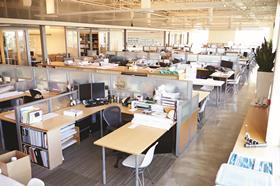A reader responds to James Maddock’s article with a personal recollection

I found James Maddock’s thoughtful article of great interest (“Space: The final frontier”, 23 January 2015, page 31). My experience of the work space is mainly from BDP’s late Preston office, in which I worked for 30 years and at the end of which comprised about 300 staff, mostly working in open plan office space.
The principal aim was to establish flexible space for any size of multi-profession design teams to work together for the duration of a project. Work spaces were visually separated from each other by moveable screens at shoulder height, to provide a feeling of privacy when seated and a limited opportunity to personalise one’s own work space. There were meeting rooms of various sizes, up to a size necessary for a major conference and down to the space required for the occasional need for private or sensitive working - the latter rarely needed.
There was only ever one private office, for the senior partner and when he retired it became one more conference/meeting room. Otherwise, partners and staff shared the same total space.
We were always proud to show clients and other visitors round: although the clients were always complimentary, very few adopted open plan working themselves. I recall visiting Boots’ head office at Nottingham shortly after their new office block had been occupied. It had been their intention that it should be totally open plan, but senior management had objected, so cellular offices had to be inserted around the perimeter.
My experience underlines much of Maddock’s thesis. We are a wealthy nation, so occupiers of office buildings deserve the quality of space to enable them to deliver what they were employed to do. For the many, a workspace should be quiet, private, well lit and heated, provide privacy and some opportunity to personalise it.
Whether open plan for the workers and private offices for the bosses should prevail is a matter for the culture of the organisation. There is a clear case for a private office for the director who needs privacy, or has to entertain important visitors, but if the desire for separation is driven only by status, open plan may be better for morale.
Malcolm Taylor FRICS, via email




























No comments yet